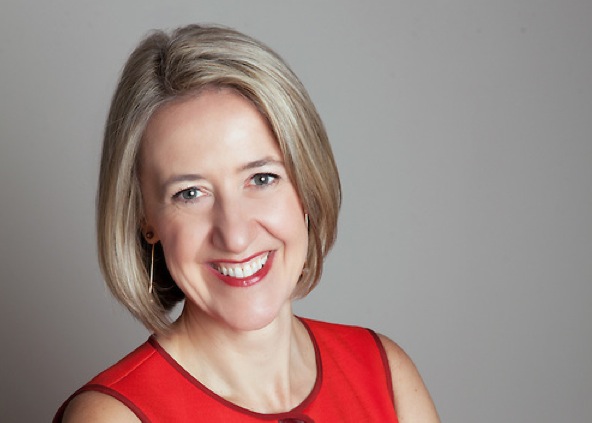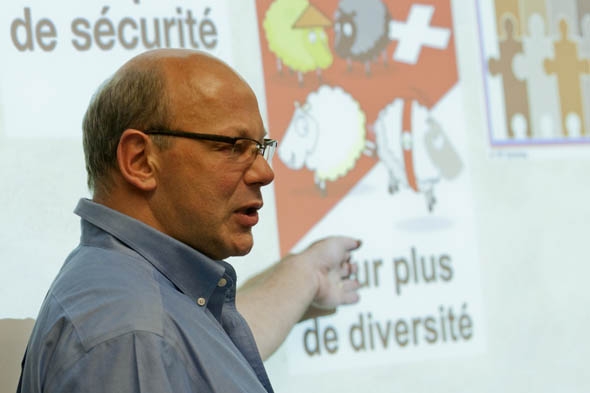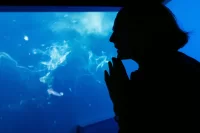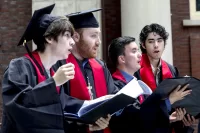
Open to the World: Foreign becomes familiar in Roger Williams Hall

French professor Alex Dauge-Roth gestures during the faculty conversation about global citizenship held prior to the dedication of Hedge and Roger Williams halls. Photograph by Phyllis Graber Jensen.
Bates’ global reach has been a driving theme behind Open to the World: Bates Celebrates Unbounded Learning, a celebration of new academic spaces including Roger Williams Hall, home to the college’s foreign language programs and Off Campus Study Office.
So the foreign language faculty took an hour or so during the afternoon of Oct. 27, the day the newly renovated Bill and Hedge Hall were dedicated, to present a sampling of courses and projects in their repertoire.
Dedicated to the idea of educating students for global citizenship, here are a few highlights from the presentation in the brand-new Language Resource Center:
- Alex Dauge-Roth, associate professor of French, talked about his course “Border and Disorders in French and Francophone Literature and Films.” An apt choice for a week of Bates programming devoted to breaking down borders, the course examines representations of inclusion and exclusion — for example, two opposing political ads that use, in nearly identical ways, the symbol of a black sheep among white ones to support either openness to immigration or rejection of it. “The idea is to complexify for students how they define their borders,” Dauge-Roth said. “You cannot be at home without excluding others.”
- Against a backdrop of Central European images taken last year by Rachel Morrison ’13, Professor of German Craig Decker offered a capsule history of Bates Fall Semester Abroad programs in Vienna and Berlin. Noting that all FSA programs, not just the German-language trips, are interdisciplinary by design, he said, “It’s interesting to see how students combine what goes on in the two courses.” It’s a kind of synthesis “that doesn’t always happen on campus.”
- Sarah Strong, professor of Japanese, cut to the heart of cross-cultural exchange in describing her course “The Fantastic in Modern Japan.” Looking at comics, fiction and anime film, the course encourages students to discover what’s common among cultures — but more important, to “encounter what is unfamiliar that they can learn about and bring into their sphere of understanding.” For example, how the young heroine in the manga and film Nausicaa of the Valley of the Wind comes to terms with the toxic fungal forest that is consuming a post-apocalyptic world.
- A fascinating translation project undertaken by Professor of Spanish Francisca López, Lecturer in French Laura Balladur and others: Students in certain foreign-language courses have translated work by the poets participating in the college’s annual Translations international poetry festival (taking place concurrently with the Open to the World events). During the festival, the student translations have been projected on a screen while the poets read them in the original language. For the second part of the course, the students translate into French and Spanish poems written by students in a poetry course taught by Senior Lecturer in English Robert Farnsworth — and all the students, translators and translated, meet to discuss the linguistic and cultural issues that are gained in translation.




